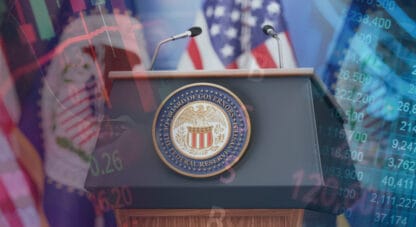In the Foothills of Its Everest
Outside of a wild week of Middle East geopolitics and volatile market price action, this week was relatively quiet on Wall Street. The profound exception to that quiet, however, was the absolute racket made by a gaggle of Federal Reserve speakers led by Chairman Powell himself.
After last week’s third consecutive hot CPI inflation upside surprise, the seemingly coordinated mission on the part of aggregate Fed-speak this week was to retake the high ground on the inflation fight, push back on rate cut expectations, and recapture the narrative of a hawkish Fed standing boldly, talons out, between the American people and the ravages of inflation.
The coordinated hawkish policy pushback this week began with San Francisco Federal Reserve President Mary Daly saying there is “no urgency” to cut U.S. interest rates. Then it was New York Fed President John Williams, who became the latest U.S. rate setter to embrace the new “no rush” on rate cuts mantra. Following Williams, Chicago Federal Reserve President Austan Goolsbee began a retreat from his previous dovish leaning towards rate cuts. Goolsbee said that, given recent inflation data, “I believe the Fed’s current restrictive monetary policy is appropriate,” and that “right now, it makes sense to wait and get more clarity before moving [to cut rates].” Next up, Minneapolis Fed President Neel Kashkari tried to throw on the hawk suit and sharpen his talons when suggesting that the Federal Reserve may have to wait until 2025 to cut rates.
In short, in light of reaccelerating inflation data on track to 4-5% by the US presidential election, the hawkish pushback wasn’t all that hawkish at all. The Fed-speak hinted at little more than a soft pause delaying the initiation of the rate cut cycle, while Kashkari specifically is a bit more political performer than hard-nosed policy maker. His dovish feathers will always be visible under any hawk suit. After all, Kashkari will forever live in infamy as the Fed governor who, in June of 2021, most vigorously opposed rate hikes “through at least 2023” even as inflation was accelerating towards an incendiary 9.1% peak.
Lastly, it was the big hitter, Fed Chairman Powell, who stepped up to the plate this week to serve the cause of a hawkish Fed narrative shift. Powell said the recent disappointing inflation data means the Federal Reserve will likely need more time before it can lower interest rates. On Tuesday at an event sponsored by the Wilson Center, Powell said, “The recent data have clearly not given us greater confidence” that inflation is headed toward the central bank’s 2% goal, “and instead indicate that it’s likely to take longer than expected to achieve that confidence [for the Fed to cut rates].” Powell continued, “Right now, given the strength of the labor market and progress on inflation so far, it’s appropriate to allow restrictive policy further time to work and let the data and the evolving outlook guide us.”
All in all, it was a respectable effort on the part of the greater Fed family to save its credibility and temporarily push the narrative back toward higher-for-longer rates 2.0. However, the new “no rush” posturing is hardly an aggressive stance against inflation. It treats reaccelerating inflation data as an inconvenient disappointment, merely delaying the inevitability of the rate cuts the Fed is already all too anxious to deliver.
Again, this is Powell’s pickle. He can’t cut rates because of inflation, but he can’t not cut rates because, at nearly $35 trillion of government debt, the blowout in interest expenses will fast-track a debt spiral. Powell is in a real bind here, and the handcuffs continue to tighten each week.
Despite this week’s hawkish pushback, however, HAI believes the Fed has already thoroughly tipped its pitch. It wants to ease policy as soon as possible once it has the slightest excuse to do so credibly. It lost the hawkish high ground with its premature verbal pivot in December, and now that high ground is as long gone as a 500-foot home run. That ball isn’t coming back, and neither is a credible second act at playing the hawk by the United States Federal Reserve.
That said, market participants have been rushing headlong into the financial asset “trust me” trade enabled by Fed Chair Powell’s Goldilocks assurances to bring inflation down to target “unconditionally” while simultaneously lowering interest rates in 2024. That trade is now vulnerable and in serious jeopardy of an unwind. And while HAI has long anticipated the breakdown of the Goldilocks thesis, it’s beginning to unravel at an accelerated pace since last week’s hot CPI report. Predictably, we are beginning to see a rotation from financial assets toward hard assets.
Stock market investors are now pulling money out of equities over the last two weeks ($21.1 billion according to EPFR Global data) at the fastest pace since December 2022. At the same time, company insider stock sales are outpacing insider purchases by a monumental extreme of 50 to one. Magnificent Seven market leadership is beginning to crack, and even Mag-7 team captain, bull market champion, and AI poster child Nvidia is suddenly off over 20% from its highs. In fact, Nvidia is now below its 50-day moving average for the first time since October, and is in official bear market territory after having erased a staggering $400 billion in market cap just since March 8th.
Meanwhile, the merits of the hard asset thesis are beginning to shine bright and catch the attention of a growing number on Wall Street. Gold remains strong, advancing in record territory as investors increasingly appreciate the appeal of financial insurance while the frozen-in-place Fed is trapped uncomfortably between a lose/lose choice of debt crisis or reaccelerating inflation.
At the same time, Wall Street is also beginning to warm up to the opportunities in other real asset commodity markets. This week, JPMorgan touted the opportunity in energy, saying, “we are at the tipping point in terms of demand… More and more of the world is getting access to energy, and a greater proportion want to use that energy to upgrade their living standards.” JPMorgan went further to warn of the need for a “reality check” if we think we can meet that growing demand without significant investments in oil, gas, and nuclear energy production. Over at Goldman Sachs this week, the hard asset excitement was focused on copper. After the red metal’s 28% advance off of last year’s lows, the investment bank offered the quote of the week. Goldman described copper prices as merely “in the foothills of what will be its Everest.”
Markets participants are beginning to recognize a trapped Fed and a secular inflationary shift of long-term significance. As those market participants start to adapt to the new set of rules, hard assets are poised to shine increasingly bright. HAI shares Goldman’s view, but would expand upon it: hard assets as a whole are only in the foothills of what will be their Everest.
Weekly performance: The S&P 500 declined 3.05%. Gold gained 2.24%, silver was higher by 2.85%, platinum was off 4.68%, and palladium dropped 3.03%. The HUI gold miners index was nearly flat, off 0.09%. The IFRA iShares US Infrastructure ETF was off 0.65%. Energy commodities were volatile and lower on the week. WTI crude oil lost 3.75%, while natural gas was off 1.13%. The CRB Commodity Index was nearly flat, up 0.09%. Copper was up 4.39%. The Dow Jones US Specialty Real Estate Investment Trust Index was down 2.47%. The Vanguard Utilities ETF was up 1.72%. The dollar index was off 0.06% to close the week at 105.95. The yield on the 10-yr U.S. Treasury gained 12 bps to close at 4.62%.
Have a wonderful weekend!
Best Regards,
Morgan Lewis
Investment Strategist & Co-Portfolio Manager
MWM LLC















